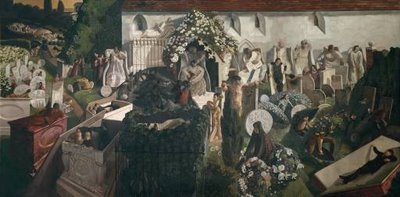 I was reminded the other day of the English artist Stanley Spencer. I doubt he's well known outside of the UK: he was in some ways a very provincial figure.
I was reminded the other day of the English artist Stanley Spencer. I doubt he's well known outside of the UK: he was in some ways a very provincial figure. He lived almost his whole life in the small village in which he was born, Cookham-on-Thames, just to the West of London. And very many of his most famous paintings are of Cookham and its inhabitants, as he translates religious edict and prophecy into the vernacular of rural England.
Here, for instance, is his depiction of the Day of Judgement, set in the Cookham parish churchyard of the 1920s. As the Tate Britain website notes, it shows "risen souls [. . .] transported to Heaven in the pleasure steamers that then ploughed the Thames."

Other subjects of Spencer's paintings include "Christ Preaching at Cookham Regatta" and a "Last Supper" set in the village malthouse.
There is something in Spencer of Orwell's famous evocation of Englishness in terms of "old maids biking to Holy Communion through the mists of the autumn mornings." Though in the same breath Orwell also wrote of "the lorries in the Great North Road, the queues outside the Labour Exchanges," a fact rather overlooked by Tory Prime Minister John Major when he tried to yoke this text to his own nostalgic cause.
And likewise in Spencer, perhaps, the immanence and imminence of this quotidian divinity, in which a day of reckoning might take place around the corner from the village high street, is also on reflection not quite as homely or as comforting a thought as it might first appear. No longer are the provinces a sleepy backwater; they're the site in which cosmic forces are unleashed.
Cross-posted to Long Sunday.
No comments:
Post a Comment